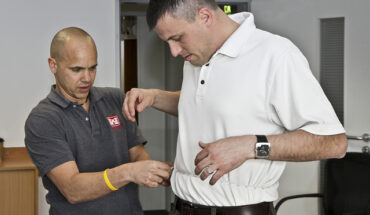
Research has established a clear correlation between confidence and enhanced performance. When you feel good about yourself you’ll perform better. Put another way, feeling bad or negative about yourself will adversely affect your chances of success.
It makes sense, then, to actively look for ways to increase your sense of confidence and well-being. But how can you shake off self-doubt and a lack of confidence?
Professor at Harvard Business School and author of Confidence Rosabeth Moss Kanter recommends avoiding the following eight confidence-sapping traps.
Self-defeating assumptions. Don’t give up before you’ve started. Until you’ve had a crack you’ll never know. The stories you tell yourself about your limitations and failings are crucial to your chance of success. Start telling yourself a powerful inner story.
Setting goals that are too big or too distant. I did that with my 50 chin-up challenge last year. That goal was too big considering what I’d achieved to that point. If you are going to set big goals, break them down into smaller goals. For example, losing 10 kilograms this year sounds much bigger than losing 800 grams per month. Sure, have big, stretch goals, but have small goals too. They’ll give you the much needed small victories that will help build your confidence.
Don’t declare victory too soon. I often see this with sales people where they have a couple of good months then put a deposit on the new Porsche. Confidence comes from knowing that you’ve had the discipline to see a task through to completion, not from pandering to an out-of-control ego.
Trying to do it all yourself. Success is a team sport and the best way to develop a winning team is to develop those around you. That means helping them improve their career, their skills, and giving them a sense of their own self worth. Do this and you’ll instantly feel better about yourself.
Blaming someone else. True confidence demands that we take responsibility for our results and our reactions. Shifting the blame for our failures implies that someone else is responsible for our success. Both are disempowering so take responsibility for every aspect of your life – even the bits that you wish were going better than they are today.
Being overly defensive. Being sensitive to criticism means you’re playing someone else’s game. If you’ve made a mistake, apologise but be proud of who you are and what you’ve achieved. When you’re proud of you there’s no need to defend. Sticks and stones and all that stuff.
Neglecting to anticipate setbacks. Being confident allows you to tackle difficult goals despite knowing there’ll be setbacks and a chance that you’ll fail. It’s important to anticipate obstacles, not as a way to stop you from going for your goals, but to give you something to work through or around. Setbacks are the lifeblood of confidence because they give us a story to tell when we’ve overcome them.
Avoid overconfidence. It’s one thing to be confident but another to be arrogant. No-one likes a know-it-all so keep your feet on the ground and your heart humble.
What would you add to this list?
Photo credit: Philo Nordlund on Flickr


